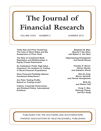
JOURNAL OF FINANCIAL RESEARCH
Scope & Guideline
Exploring the Frontiers of Financial Innovation
Introduction
Aims and Scopes
- Corporate Finance and Governance:
The journal emphasizes studies that explore corporate financial decisions, governance structures, and their implications for performance and value creation. - Market Behavior and Efficiency:
Research focusing on market dynamics, price efficiency, and the impact of trading behaviors on asset prices is a core area of interest. - Risk Management and Financial Stability:
The journal publishes work that addresses risk management strategies, particularly in banking and corporate finance, as well as issues related to financial stability. - Investment Strategies and Portfolio Management:
A significant focus is placed on innovative investment strategies, portfolio management techniques, and the role of institutional investors. - Behavioral Finance and Decision-Making:
The journal includes studies that investigate the psychological factors influencing financial decision-making by individuals and institutions. - Emerging Markets and Global Finance:
Research that examines financial practices and market behaviors in emerging economies, along with global financial integration, is also featured. - Financial Regulation and Policy:
The influence of regulatory frameworks and policies on financial markets and institutions is another key area of exploration within the journal.
Trending and Emerging
- Impact of Technology on Finance:
There is an increasing focus on how technological advancements, such as artificial intelligence and blockchain, are transforming financial practices and risk management. - Sustainability and ESG Factors:
Research exploring the integration of environmental, social, and governance (ESG) factors into financial decision-making is on the rise, reflecting a growing awareness of corporate responsibility. - Behavioral Insights in Financial Decision-Making:
Emerging studies are delving deeper into behavioral finance, examining how cognitive biases and social factors affect investment decisions and market outcomes. - Global Economic Impacts on Finance:
The journal is witnessing a trend towards research that analyzes the effects of global economic events, such as geopolitical conflicts and economic policy changes, on financial markets. - Diversity and Inclusion in Finance:
There is a marked increase in studies investigating the role of diversity in corporate governance and its impact on financial performance, which aligns with broader societal movements. - Financial Literacy and Education:
Emerging themes include the importance of financial literacy and education in enhancing decision-making among individuals and small businesses, particularly in the context of new financial products.
Declining or Waning
- Traditional Financial Theories:
There has been a noticeable decline in papers focusing on classical financial theories, as newer, more innovative approaches and empirical analyses take precedence. - Static Risk Assessment Models:
Research employing static models for risk assessment appears to be waning, as the field moves towards dynamic and multifaceted approaches to risk management. - Mundane Financial Reporting:
Papers centered on basic financial reporting practices and compliance without innovative insights or applications are becoming less common, as the focus shifts to more impactful analyses. - Narrow Geographic Focus:
Studies concentrating solely on localized financial phenomena without a broader context or comparative analysis are less frequently published, indicating a trend towards more global perspectives. - Historical Financial Analysis:
Research that primarily relies on historical data analysis without addressing current market conditions or future implications is seeing a decrease in frequency.
Similar Journals
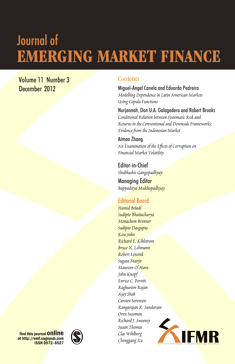
Journal of Emerging Market Finance
Exploring the Dynamics of Emerging MarketsThe Journal of Emerging Market Finance, published by SAGE Publications India Pvt Ltd, is a premier academic journal that serves as a vital resource for researchers, professionals, and students in the fields of finance and economics. Established in 2002, this journal focuses on the multifaceted dynamics of emerging market economies and their financial systems. With an ISSN of 0972-6527 and an E-ISSN of 0973-0710, it has garnered attention with its respectable Q3 rankings in both the Economics and Econometrics and Finance categories, reflecting its commitment to high-quality research. Despite its limited open-access options, the journal remains a significant platform for scholarly discussions, providing insights on emerging financial instruments, market behaviors, and economic policies in developing economies. As a continuously evolving publication, it aims to bridge the gap between theory and practice, promoting an understanding of the complexities faced in these vibrant markets, ultimately serving the academic community with relevant and impactful research until 2024 and beyond.
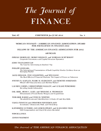
JOURNAL OF FINANCE
Shaping the future of finance through impactful research.JOURNAL OF FINANCE, published by Wiley, stands as a premier academic journal in the fields of finance, economics, and accounting. With a history dating back to 1946, the journal has consistently delivered impactful research that shapes financial theory and practice, boasting an impressive impact factor reflective of its high citation rate. Its Quartile 1 ranking in Accounting, Economics and Econometrics, and Finance illustrates its leading position within these disciplines. Although not an open access publication, the journal continues to be indispensable for researchers, professionals, and students seeking to advance their understanding and knowledge through rigorous empirical analysis and comprehensive reviews. With an esteemed global readership, the JOURNAL OF FINANCE remains committed to fostering the dissemination of innovative financial research well into 2024 and beyond.
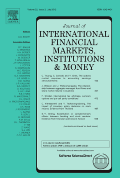
Journal of International Financial Markets Institutions & Money
Innovating Research in International FinanceThe Journal of International Financial Markets, Institutions & Money, published by Elsevier, serves as a leading platform for the dissemination of high-quality research in the fields of finance, economics, and econometrics. With an impressive impact factor reflected in its status as a Q1 journal in both categories for 2023, it ranks among the top journals, positioned at #47 out of 317 in Finance and #111 out of 716 in Economics. This journal offers a unique focus on the interplay between financial markets and institutions on a global scale, making it an essential resource for scholars, practitioners, and students alike. The journal welcomes innovative theoretical, empirical, and applied research, contributing to an exciting dialogue that shapes the future of international finance. For researchers looking to publish their findings, this journal is committed to rigorously engaging with contemporary financial phenomena, positioning itself as a vital cornerstone of academic and professional discourse.
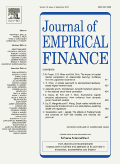
Journal of Empirical Finance
Driving innovation in finance with evidence-based studies.Journal of Empirical Finance, published by Elsevier, stands as a key resource in the areas of finance and economics, with a definitive focus on empirical studies. As a prominent journal since its inception in 1993, it has made significant strides in contributing to the academic community, evidenced by its soaring categorization in Q1 for Finance and Q2 for Economics and Econometrics as of 2023. With an ISSN of 0927-5398 and an E-ISSN of 1879-1727, the journal emphasizes robust, data-driven analysis to inform both theoretical and practical aspects of financial research. While access options do not include open access, the journal ensures that its content remains accessible to a diverse audience of researchers, professionals, and students. It fosters a platform for innovative research and discourse, significantly impacting the fields of finance, economics, and econometrics. The Scopus rankings further bolster its reputation, placing it in the 61st percentile in both categories, reflecting a commitment to high-quality research output. As the journal continues to evolve, it invites contributions that push the boundaries of empirical finance, enabling a deeper understanding of financial mechanisms that drive global economies.
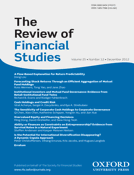
REVIEW OF FINANCIAL STUDIES
Unveiling Insights for Financial ExcellenceREVIEW OF FINANCIAL STUDIES, published by Oxford University Press Inc, stands as a premier academic journal in the realms of accounting, economics, and finance. With an impressive Impact Factor that reflects its high citation rates and broad influence, this journal, with an ISSN of 0893-9454 and E-ISSN 1465-7368, is considered a cornerstone for researchers, academics, and professionals seeking to contribute to and stay updated on groundbreaking developments in financial studies. Since its inception in 1996, it has established a robust reputation, consistently ranking in the Q1 category across multiple disciplines, highlighting its elite status in the global academic landscape. The Scopus rankings further reinforce its importance, positioning it at the forefront of business, economics, and finance research. While the journal is not open access, it offers vital insights and comprehensive studies that foster a deeper understanding of contemporary financial issues and methodologies. Located in the United Kingdom, the REVIEW OF FINANCIAL STUDIES is an essential resource for those aiming to advance their knowledge and research in this dynamic field.
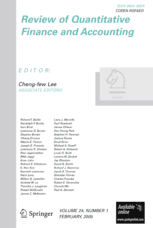
Review of Quantitative Finance and Accounting
Pioneering Quantitative Approaches for Tomorrow's ChallengesThe Review of Quantitative Finance and Accounting, published by Springer, is a distinguished academic journal that has been at the forefront of scholarly discourse since its inception in 1991. With an ISSN of 0924-865X and an E-ISSN of 1573-7179, this journal specializes in the interdisciplinary realms of accounting and finance, particularly emphasizing quantitative methodologies and their applications in real-world scenarios. With an impressive track record reflected in its 2023 rankings, it sits in the Q2 category across key fields such as Accounting, Business Management, and Finance, demonstrating its relevance and influence within these domains. Although it operates without an Open Access option, the journal's content remains vital for researchers, professionals, and students aiming to deepen their understanding of quantitative approaches in finance and accounting contexts. The Review of Quantitative Finance and Accounting stands as an essential resource for advancing knowledge and fostering innovation within these critical disciplines.

JOURNAL OF FINANCIAL AND QUANTITATIVE ANALYSIS
Illuminating Critical Issues in Financial AnalysisJOURNAL OF FINANCIAL AND QUANTITATIVE ANALYSIS, published by Cambridge University Press, is a premier peer-reviewed journal that has been at the forefront of the finance and economics fields since its inception in 1966. With a notable impact factor reflecting its Q1 status in Accounting, Economics and Econometrics, and Finance for 2023, the journal is recognized for its substantial contributions to both theoretical and empirical research. Researchers and practitioners alike benefit from its comprehensive scope, addressing critical issues in financial analysis and quantitative methods. Although the journal does not currently offer open access, it remains widely accessible through institutional subscriptions. The editorial team is committed to fostering rigorous academic discussions that shape the future of finance and economics, making it an essential resource for academics, students, and industry professionals seeking to deepen their understanding of these vital disciplines. For more than five decades, this journal has continued to be an indispensable platform for disseminating influential research, thus solidifying its role as an essential cornerstone in the financial and quantitative analysis community.

Financial Innovation
Leading the Charge in Financial and Technological AdvancementsFinancial Innovation, published by Springer, is a premier open access journal that has been contributing to the fields of finance and management of technology and innovation since its inception in 2015. With an impressive Q1 category ranking in both Finance and Management of Technology and Innovation, the journal places itself at the forefront of academic research, reflected in its Scopus rankings—#17 out of 317 in Finance (94th percentile) and #29 out of 289 in Management of Technology and Innovation (90th percentile). Centered in Germany, this journal aims to disseminate high-quality research that fosters theoretical and practical advancements within its scope, encouraging exchanges between academia and industry. The open access model enhances visibility and accessibility of published research, thus playing a critical role in shaping the future of financial practices and technology management. For researchers, professionals, and students alike, Financial Innovation remains essential for staying abreast of cutting-edge developments and trends in these dynamic fields.
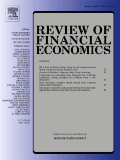
Review of Financial Economics
Unraveling Complexities in Financial EconomicsReview of Financial Economics, published by WILEY, stands as a prominent peer-reviewed journal in the fields of economics and finance. Established in 1994, this journal provides a platform for rigorous research and thoughtful discourse, contributing to the advancement of knowledge in financial theory and its applications. With an HIndex indicative of its citation impact, it ranks in the Q3 quartile for both Economics and Econometrics, as well as Finance, based on the 2023 categorization, underscoring its role in the academic community. Although it does not currently offer Open Access, the journal remains accessible to a wide audience through institutional subscriptions. Researchers, professionals, and students are encouraged to engage with its insightful articles that address contemporary issues and advancements within financial economics, fostering a deeper understanding of the complex interplay between economic systems and financial markets.
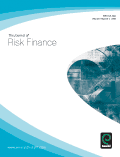
Journal of Risk Finance
Empowering research for informed financial decisions.The Journal of Risk Finance, published by Emerald Group Publishing Ltd, is a premier academic journal dedicated to advancing the understanding of risk management and finance practices since its inception in 1999. With a strong foothold within the Q2 rankings in both Accounting and Finance categories, it proudly holds a significant place in the scholarly landscape, ranking #54 out of 317 in the Scopus Economics and Finance category, placing it in the 83rd percentile. The journal aims to facilitate the exchange of innovative research and practical insights, catering to an audience of researchers, professionals, and students eager to explore contemporary issues in risk finance. While not an open access journal, it provides numerous access options, ensuring that essential findings reach a broad readership. Set in the United Kingdom and covering publications up to 2024, the Journal of Risk Finance continues to be an indispensable resource for those committed to this critical field.